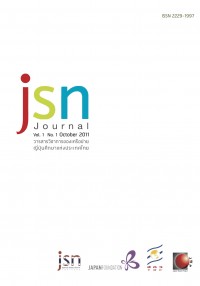ความสัมพันธ์ระหว่างคนกับวัว บนเกาะโทะกุโนะฌิมะ
Main Article Content
Abstract
ความสัมพันธ์ระหว่างคนกับสัตว์ในปัจจุบันมีความซับซ้อนและหลายรูปแบบ สัตว์มีความหมายในเชิงวัฒนธรรมมากขึ้น ขณะเดียวกันก็มีบทบาทในเชิงเศรษฐกิจด้วย ประเพณีชนวัวของเกาะ โทะกุโนะฌิมะเป็นอีกหนึ่งรูปแบบของการใช้สัตว์ในเชิงวัฒนธรรม วัวชนที่เก่งมีประวัติการแข่งขันดี นอกจากจะให้ผลประโยชน์เชิงวัฒนธรรม ยังให้ผลประโยชน์เชิงเศรษฐกิจแก่เจ้าของ กล่าวคือยิ่งชนเก่งก็จะยิ่งมีราคาแพง ในทางกลับกัน หากวัวชนต่อสู้ไม่ได้อีกราคาก็จะตกลง แสดงให้เห็นว่า ผลประโยชน์เชิงวัฒนธรรมของ วัวชนสัมพันธ์กับผลประโยชน์เชิงเศรษฐกิจ นอกจากนี้ เกาะโทะกุ-โนะฌิมะไม่ได้มีแต่วัวชน หากยังมีวัว “ผลิต” หรือวัวพันธุ์เนื้อเพศเมียที่เลี้ยงเพื่อผลิตลูกวัวไว้จำหน่าย วัว “ผลิต” ให้ผลประโยชน์เชิงเศรษฐกิจแก่เจ้าของเพียงอย่างเดียว เนื่องจากเจ้าของไม่ได้ผูกพันกับมันมากไปกว่าการเป็น “ปศุสัตว์” เมื่อมองจากมุมมองเรื่องเพศของวัวพบว่า วัวเพศผู้มีความหมายหรือให้ผลประโยชน์แก่เจ้าของมากกว่าเพศเมีย เพราะเป็นได้ทั้งวัวชนและวัวเนื้อที่ราคาแพง ส่วนวัวเพศเมียแทบไม่ได้รับการยกย่องว่ามีความสำคัญหรือมีคุณค่ามากไปกว่าการเป็นแม่วัวเพื่อผลิตลูกวัว เมื่อทำหน้าที่ต่อไปไม่ได้ก็จะถูกจำหน่ายออกในราคาถูกเพื่อนำไปฆ่า
The Relationship between Human Beings and Bulls on Tokunoshima Island
Chomnard Setisarn
Faculty of Arts, Chulalongkorn University
Recently, there has developed a considerable interest in the relationships between human beings and animals in terms of their complexity and variety. Animals have significance not only in business but in cultural dimensions also. The bullfighting tradition of Tokunoshima Island is a good example of the use of animals to transfer desirable cultural meanings. The fighting bull itself has significant value for its owner–a strong bull with a high profile in competitions will provide cultural value by acting as a status symbol for its owner. Strength in competitions equally means a good selling price for the bull. Conversely, a weak bull has less status and lower value in both the fields of culture and commerce. Hence, it can be illustrated that there is a direct correlation between a fighting bull’s cultural value and its selling price. In Tokunoshima Island not only bulls are raised. So-called “productive cows”, adult female cows that are large and are kept on farms for producing offspring, are raised as well. The “productive cow” is raised only for the sake of “livestock” since it has no special bonds between the owner and the cow. In respect to the gender of this kind of animal, it is obvious that a bull is more culturally appreciated and will get a higher selling price than a cow, since a bull can be raised to be both a strong fighting bull and a high-cost meat bull. On the other hand, when a cow gets older and becomes useless, it will be sold at a very low price and finally be killed in a slaughterhouse.
Article Details
ข้อความและข้อคิดเห็นต่างๆ ในบทความเป็นของผู้เขียนบทความนั้นๆ ไม่ใช่ความเห็นของกองบรรณาธิการหรือของวารสาร jsn Journal


